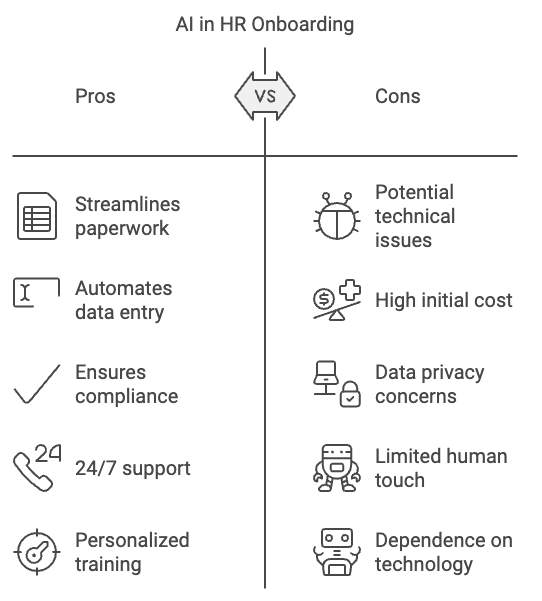Artificial Intelligence is quietly transforming the landscape of Human Resources, particularly in the domain of employee onboarding. As organizations seek to streamline their processes and enhance new hire experiences, AI-driven solutions are emerging as powerful tools to automate tedious tasks, personalize training, and provide round-the-clock support. However, the need for improvement is clear, as only 12% of US employees say their organization has a good onboarding process. While the benefits of AI in onboarding are becoming increasingly apparent, questions remain about its impact on human interaction and the potential challenges of implementation. As we explore this technological shift, it’s essential to reflect on both the opportunities and the implications for the future of HR practices.
Key Takeaways
AI-Driven Onboarding Automation
AI-driven onboarding automation transforms the traditional human resources paradigm by streamlining four key aspects of the process: paperwork management, data entry, employee support, and training customization. This groundbreaking approach liberates HR personnel from repetitive tasks, allowing them to focus on meaningful interactions with new hires.
Intelligent digital forms automate paperwork generation and management, ensuring compliance and minimizing errors. Data entry becomes effortless as AI systems validate and process employee information swiftly. The implementation of AI chatbots provides round-the-clock support, handling multiple queries simultaneously and reducing the burden on HR staff.
Employee onboarding experiences are elevated through personalized learning pathways, crafted using data-driven insights from AI tools. These tailored approaches enhance engagement and retention by aligning training materials with individual competencies and organizational frameworks. Continuous improvement is facilitated through automated surveys, collecting real-time feedback that enables rapid adjustments to the onboarding process.
This AI-driven transformation in onboarding not only optimizes efficiency but also empowers new employees with seamless, personalized experiences. By leveraging technology to automate administrative tasks and enhance support mechanisms, organizations can foster a culture of innovation and employee-centric growth from day one.
Personalized Employee Experiences
Building upon the foundation of automated onboarding processes, personalized employee experiences emerge as a key differentiator in modern human resources strategies. AI-driven training materials and personalized learning pathways transform how organizations tailor the onboarding experience to individual needs. AI’s capability to analyze employee data and deliver customized content is transformative.
| AI-Driven Personalization | Employee Benefits |
|---|---|
| Skill gap analysis | Targeted learning |
| Customized content | Efficient growth |
| Adaptive learning paths | Increased engagement |
| Mentor matching | Enhanced support |
Continuous monitoring of new hires’ progress through AI-driven skill gap analysis enables adaptive onboarding experiences that cater to individual learning trajectories. This approach not only enhances the onboarding experience but also fosters a sense of value and support among new employees. By leveraging AI to match new hires with relatable team members and generate automated, personalized checklists, organizations create a more engaging and supportive environment. This liberating approach to onboarding empowers employees to take control of their development while ensuring they receive the necessary guidance and resources to succeed in their new roles.
24/7 Support and Information Access
Consistently, the implementation of AI-powered support systems transforms information access during the onboarding process. AI-powered portals offer 24/7 self-service HR support, granting new hires unprecedented autonomy in accessing critical resources. This liberation from traditional time constraints empowers employees to engage with onboarding materials at their convenience, fostering a sense of control over their integration.
Chatbots, a key component of these systems, innovate query resolution by handling multiple inquiries simultaneously. This efficiency not only reduces dependence on HR personnel but also provides instant responses, mitigating new hire stress and bolstering confidence. Centralized knowledge bases further enhance this accessibility, ensuring a thorough repository of information is readily available.
The AI-driven onboarding experience continuously evolves through the analysis of employee interactions. This data-driven approach allows for iterative improvements, ensuring that support remains relevant and effective. By leveraging AI to streamline information access, organizations create a more fluid and supportive onboarding process. This technological integration not only optimizes resource allocation but also cultivates an environment where new hires feel valued and empowered, laying the foundation for long-term engagement and organizational loyalty.
Data-Driven Onboarding Insights
The integration of data-driven insights into onboarding processes transforms how organizations understand and optimize their new hire experiences. Data analytics play an essential role in identifying skill gaps among new employees and recommending personalized training to address these deficiencies. This targeted approach enhances the onboarding experience and promotes employee retention by effectively addressing individual needs.
AI-driven insights enable HR departments to track onboarding completion rates and identify employees requiring additional support, fostering engagement. Automated surveys and sentiment analysis provide both qualitative and quantitative feedback, offering a thorough view of the onboarding experience and highlighting areas for improvement.
Enhancing Retention Through AI
Retention stands at the forefront of AI-driven onboarding strategies, with organizations leveraging intelligent systems to greatly reduce employee turnover. This improvement is attributed to the personalized onboarding experiences crafted through AI’s analysis of individual profiles, fostering a sense of belonging and commitment among new hires.
The impact of AI on retention is further evidenced by the 85% satisfaction rate reported by employees who undergo AI-driven onboarding processes. This heightened satisfaction translates into an 82% boost in retention rates, as effective onboarding cultivates a strong foundation for long-term engagement. Continuous feedback mechanisms, powered by AI, enable real-time adjustments to onboarding protocols, ensuring that employee needs are promptly addressed and engagement levels remain high. Furthermore, data-driven insights derived from AI systems facilitate the identification of skill gaps and training requirements, allowing for tailored onboarding experiences that align with individual career aspirations and organizational objectives. This personalized approach not only improves employee satisfaction but also contributes to enhanced retention outcomes.
Conclusion

AI integration in HR onboarding processes yields significant improvements in efficiency and effectiveness. Through automation, personalization, and continuous support, organizations can streamline operations while augmenting employee experiences. Data-driven insights enable iterative refinement of onboarding programs, addressing skill gaps and improving retention rates. As AI technology evolves, its role in HR onboarding will likely expand, further optimizing the process and contributing to organizational success through improved employee integration and satisfaction.
Not Sure How AI Can Help Your Business? Let’s Talk!

Ugnė Daniūnaitė
Business Development Manager
Book a no-obligation free consultation with our expert.

